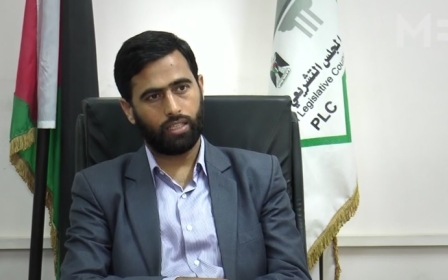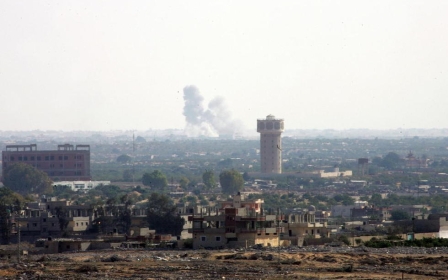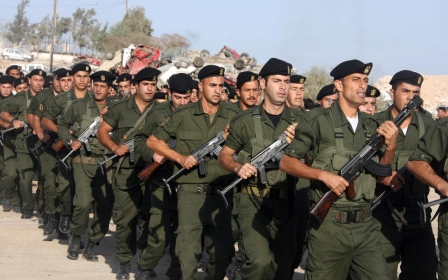Israel's change of heart towards Hamas

During Israel’s war on Gaza last year, Naftali Bennett, head of the right-wing Jewish Home party, was one of the most vocal opponents of any ceasefire that would leave Hamas in power.
"It would be a disaster," he told Israel's Channel 2 just a week after the fighting began. "The army can wipe out Hamas. We have a strong people which is telling the leadership 'do whatever it takes to get it over with’.”
As with any populist leader, Bennett declared himself a spokesman of "the people"; he certainly represented large sections in Israeli Jewish society for whom Hamas is considered an enemy with which Israel cannot and should not coexist, and therefore its rule over Gaza must end.
Any compliance with Hamas is hence conceived as a sign of weakness that will only encourage the Islamic organisation to continue its war against Israel.
Bennett, now education minister, has not subsequently switched political camp nor changed to see the beauty of Islam, but just over a week ago, again on Channel 2, he expressed a very different point of view regarding Hamas' rule over Gaza. "We have to initiate an international campaign to reconstruct Gaza in exchange for a halt to rearming,” he said.
Hamas, according to Bennett, does not cease to be an enemy, but for the time being the best thing to do is to freeze Israel's military activity against this organisation.
"Egypt and the Palestinian Authority want things to be bad in Gaza so that we will continue fighting; it is good for them," said Bennett. "But at this stage I am against it. The situation is that Hamas is there."
Bennett is not alone in seeing Hamas as the better option for Israel. During a conversation with Israeli residents near the border with Gaza a few weeks ago, General Sami Turgeman, the commander of the Southern Front, was quite frank on the positive aspects - in Israeli eyes - of Hamas' government in Gaza.
Hamas is an effective sovereign power, Turgeman said, and the alternative is either chaos or direct Israeli military rule.
"We have an interest to have an address in Gaza because without it the military reality will be worse," he said, explaining his reasons for preferring Hamas.
This is not to say that one year after the start of the bloodiest confrontation yet between Israel and Hamas, in which 2,310 Palestinians and 72 Israelis died, a new friendship has been forged between the two sides of the border of the Gaza Strip.
Early last week, the Israeli navy took over the small Marianne ship on its way from Sweden to Gaza, using the naval blockade as an excuse for this action, and on this very weekend Israel publicly claimed that Hamas was involved in the attacks by Islamic State on Egyptian army outposts in Sinai - a clear attempt to add fuel to the already hostile relations between Egypt and Hamas.
In a letter distributed to the activists on the Marianne who tried to break the blockade on Gaza, Prime Minister Benjamin Netanyahu boasted that Israel allows 800 lorries to go into Gaza every day and that 1.6 million tons of supplies passed through the crossings last year.
Defence Minister Moshe Yaalon went so far as to claim that there is no humanitarian crisis in Gaza and that, at most, the situation there is "unpleasant".
Yet cynicism aside, Israel is well aware that one year after its Operation Protective Edge offensive against Gaza, reconstruction there has not really begun and that Gaza may compete for being the worst place on Earth to live in.
Unemployment is at 43 percent and 100,000 Palestinians are still living without a roof. With control over all access on land and sea to Gaza, Israel bears much, if not all, of the blame for this situation.
Orit Perlov, a researcher in the Institute for National Security Studies, a conservative Israeli think tank close to the military establishment, claims that Netanyahu's or Bennett's words may be interpreted as an effort to portray Israel as the "good guys" in this story.
While the United Nations Human Rights Council adopted on 3 July a report that claims Israel may be responsible for war crimes during the last war on Gaza and raises the prospect that Israel may face war crime charges in front of the International Court of Justice, Israel wants the world to think that it is committed to Gaza's reconstruction.
But there is more to it than just public relations. According to Perlov, in a strange and somehow twisted way, Israel does have a direct interest in the reconstruction of Gaza more than other Middle East players. The Egyptian regime under President Abdel Fattah al-Sisi makes a huge effort in associating Hamas with the Muslim Brotherhood, depicting both of them as arch-enemies of the Egyptian government. Sisi shows no interest in reconstructing Gaza, as this may amount to strengthening Hamas.
Palestinian President Mahmoud Abbas cannot be indifferent, of course, to the suffering of his fellow Palestinians in Gaza, but it seems that he has lost any hope of having any influence in Gaza as long as Hamas continues its effective rule there.
The failure of yet another unity government is further proof of his impotence to bring Hamas to his own terms. In this situation, international donors, always better in promising aid than in giving it, find it difficult to have any effect, even if they wanted to.
Israel, claims Perlov, is in a panic because it feels alone with the burden of reconstructing Gaza. As General Turgeman put it bluntly, Israel has an interest in Hamas's ability to govern Gaza. Yet without reconstruction, Hamas may be tempted to start another round of violence, as the situation in Gaza is even worse now than a year ago.
Israel may tell itself that it won the war last summer, but it has clearly no appetite for a new one. Even die-hard supporters of a gung-ho policy towards Hamas, like Bennett, do not see what a new operation could achieve, except new charges of war crimes.
By being so aggressive in Operation Protective Edge, Israel may have lost its ability to deter Hamas and the Palestinians in Gaza.
Against this background it is understandable how rumours about negotiations between Israel and Hamas concerning a "floating port" near Gaza seem more plausible. Hamas denies such reports, but Fatah activists in the West Bank are more confident that such an agreement will be signed.
Bennett’s remarks hint quite clearly towards such a solution, but it is very hard to see such a deal politically. Both Netanyahu and Khaled Mashal from Hamas would have great difficulties in defending it.
Perlov said Israeli politicians and military analysts like to talk about a "weakened Hamas" as the best solution for Israel. Yet according to her, this approach is not based on reality.
If Israel were serious about reconstructing Gaza, Hamas would get stronger as it would use at least part of the funds to solidify its rule. If reconstruction fails then - as General Turgeman warned - Hamas will lose its "governability" and Gaza could descend into chaos.
After the attacks last week in Northern Sinai, just a few kilometres from the Egyptian border with the Gaza Strip, this chaos may have a name: the Islamic State.
Salafist militants have already launched missiles into Israel in the past weeks, despite Hamas's opposition. The emergence of Islamic State strongholds inside the Gaza Strip does not seem impossible. The current coexistence with Hamas, problematic as it may be, will then be looked at as a lost chance.
- Meron Rapoport is an Israeli journalist and writer, winner of the Napoli International Prize for Journalism for an inquiry about the stealing of olive trees from their Palestinian owners. He is ex-head of the News Department in Haaertz, and now an independent journalist.
The views expressed in this article belong to the author and do not necessarily reflect the editorial policy of Middle East Eye.
Photo: Israeli Education Minister Naftali Bennett (AFP)
New MEE newsletter: Jerusalem Dispatch
Sign up to get the latest insights and analysis on Israel-Palestine, alongside Turkey Unpacked and other MEE newsletters
Middle East Eye delivers independent and unrivalled coverage and analysis of the Middle East, North Africa and beyond. To learn more about republishing this content and the associated fees, please fill out this form. More about MEE can be found here.





